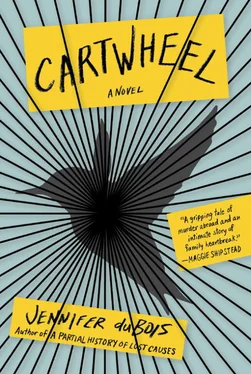“You might get some work done, I mean,” she said.
“I don’t know about that.” Andrew was suddenly nauseous, awash with their strange new calamity. There was, of course, no possibility that Lily had actually been involved in any of this; Andrew’s confidence on that point was part of what had made the situation seem, initially, not catastrophic. The accusation was so ghastly and so wild and so patently, transparently, ludicrous that he’d nearly laughed when he first heard of it. Not that there weren’t a few things he could imagine Lily getting justly arrested for. Before she had left, he and Maureen had had a series of sober conversations with her—about the harshness of Latin American drug laws, mostly, as well as the laxity of Latin American sexual safety standards. They’d sent her off with an enormous box of Trojans—industrial-sized, Andrew thought, issued for health clinics or music festivals, no doubt; a box that size could not possibly be intended for the use of a single human being. Andrew reeled to think of how much sex his daughter would have to have to run through all of them. Nevertheless, he had bravely and maturely had the conversation, alongside Maureen (such was their commitment to pragmatism! such was their commitment to co-parenting!), and then bravely and maturely sent Lily off with the box. And Andrew had worried about Lily constantly—he worried about her being kidnapped, trafficked, impregnated, sexually assaulted, afflicted with some horrible STD, arrested for marijuana use, converted to Catholicism, wooed by a long-lashed man with a Vespa. He worried she’d make too few friends, then he worried she’d make too many. He worried that her GPA would suffer. He worried about her bug bites. He worried so much that when there came a call from Maureen—on his work phone in the middle of the day, her voicemail left in a strangled half whisper—Andrew could taste metal in his mouth, so certain was he that something life altering had happened. And when he heard Lily was in jail, his mind flooded with grim visions of drug use and anti-Americanism and political points to be scored. He could imagine how she’d look to everyone (naïve, and entitled, no doubt), and he could easily imagine the incentive for punishing her harshly.
So when the accusation turned out not to be drugs—not drugs, or fare jumping on the metro (did Buenos Aires even have a metro?), or trespassing through someone’s field while looking at the stars, or any one of the countless thoughtless crimes that he could believe his daughter might have committed—Andrew was mostly relieved. An accusation of murder was outrageous to the point of being comic, and thus was no great threat.
Andrew had tried to communicate some of this feeling to Lily on the telephone, when she’d finally, finally, been allowed to call. “Don’t worry,” he had said, over the terrible connection. It seemed absolutely vital that Lily know she did not have to tell them she had not done it; her innocence and eventual acquittal must be the unspoken premises of all their interactions—to be referenced in passing, perhaps, but never formally declared. “I know,” he’d said. “We all know.” Mordantly, from a great distance, she’d said, “Know what?”
But now, in the overheated taxicab, with fragments of Buenos Aires flashing through the window, Andrew was beginning to wonder. He was beginning to wonder if this was indeed a catastrophe on the order of the others; he was beginning to wonder if it might join them, making a triad that would hold up his life like Roman columns. First—most importantly, most irreducibly—there was the death of Janie, their first daughter, at two and a half, from aplastic anemia. This was the tragedy that made all other tragedies pale, the template onto which all other grief was mapped. The divorce, comparatively, was a minor hiccup. Nobody had been surprised—not even he and Maureen had been surprised—though they had been disappointed, certainly, in their own lack of originality. And now there was this. It was all, Andrew thought, a little much for one lifetime—though he had to weigh it against his socioeconomic privilege, health, maleness, whiteness, heterosexuality, American citizenship, etc., etc.; he’d been in academia long enough to know how far the scales were tipped in his favor, and how strenuously he must try at all times to acknowledge this, and how earnestly he must attempt to make his life an apology for its central accidents—and yet, and yet.
“Look,” said Anna. She pointed to a mansion—enormous, drowning in its own decadence, already receding behind them. “Is that where he lives, do you think?”
Andrew was not quite sure who he was—the rich boy with whom Lily had conducted a five-week-long romance, presumably—but he was resolved to answer firmly anyway. “No,” he said, tapping Anna’s shoulder and frowning at its boniness. He tapped his own for comparison. “How are you holding up, Old Sport?” he said. He’d started calling Anna “Old Sport” sometime during her adolescence, when it became quietly clear to him that she was his least favorite daughter.
“Okay,” she said dully. “I’m tired.”
“You can conk out at the hotel.”
“I have to run at the hotel.”
“Oh. Right.”
Anna was on the cross-country team at Colby—she wasn’t a star, but was known for her diligence—and she’d gone running every day for two years straight, even on holidays, even with the flu. There had been a local newspaper article about it. She had almost cried—and it was the only time she’d almost cried—when Andrew had told her that there was no fucking way she was going to be allowed to run outside on their trip. “Your sister is locked up for life, and you’re worried about getting your exercise? Priorities, please.” He had shouted it. It had been a terrible day with Peter Sulzicki, the lawyer. “You think you’re going to run through the streets of that city? You’ll be kidnapped in five seconds flat. I don’t need another daughter arrested or dead.” Andrew wished immediately that he had not said this. To make it up to Anna, he had promised to find a hotel with a gym. But Andrew knew that this trip would break her streak, one way or another.
Poor Anna. She loved Lily, but she must have had the sense that Lily was always the one to be involved in spectacles, that Lily was the one for whom the rules were always bent. It was all the more unfair, then, that Andrew loved Lily more. Not much more—but no difference could be truly negligible when it came to the love of your children, since what it really meant was that he loved Anna less. This was only because Anna had such tough competition: Janie, precious Janie, was a tragedy, and Lily, cherished Lily, was a miracle. Anna, to her enduring misfortune, had only ever been a child.
Still, Andrew was filled with a lunge of tenderness for her now. “Hey,” he said, pulling at her ponytail.
“Dad, stop it.”
“I’ll order us some room service for when you get back. Something special. What’s the thing here? Steak?”
Anna gave him a flat stare. How could Andrew have produced a child whose face was unreadable to him? He’d made that face. “Well,” she said. “Since we’re going to be flying back and forth between here and home like every week for who knows how long, maybe you should be trying to save your money?”
She wasn’t wrong. Andrew tried not to think about how long all of the trouble with Lily might last, but he wasn’t kidding himself—even under the best of circumstances, it was probably going to last a very, very long time, and Andrew would no doubt be burning through his retirement fund to finance it. Though it was true he’d never particularly looked forward to retirement, especially now that he was alone: He imagined himself scraping along, scrambling eggs in his undershirt (he’d never learned to cook, and now he realized what an optimistic thing that was—it meant that he’d secretly believed he’d always be too busy to bother), watching the BBC at all hours of the day and night. This, exactly this, was what a life of the mind got you, give or take a 401(k) and some unnatural disasters.
Читать дальше












